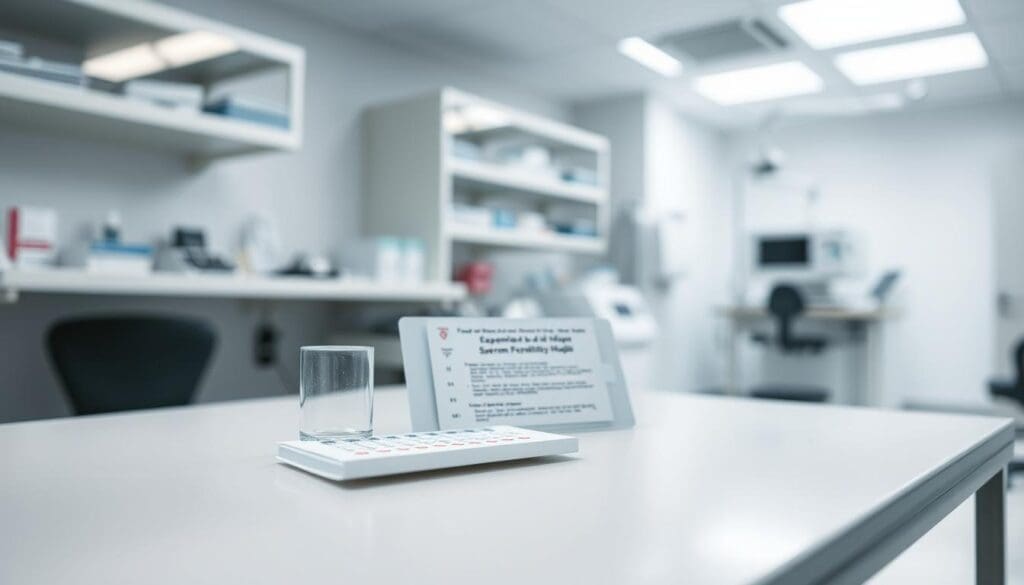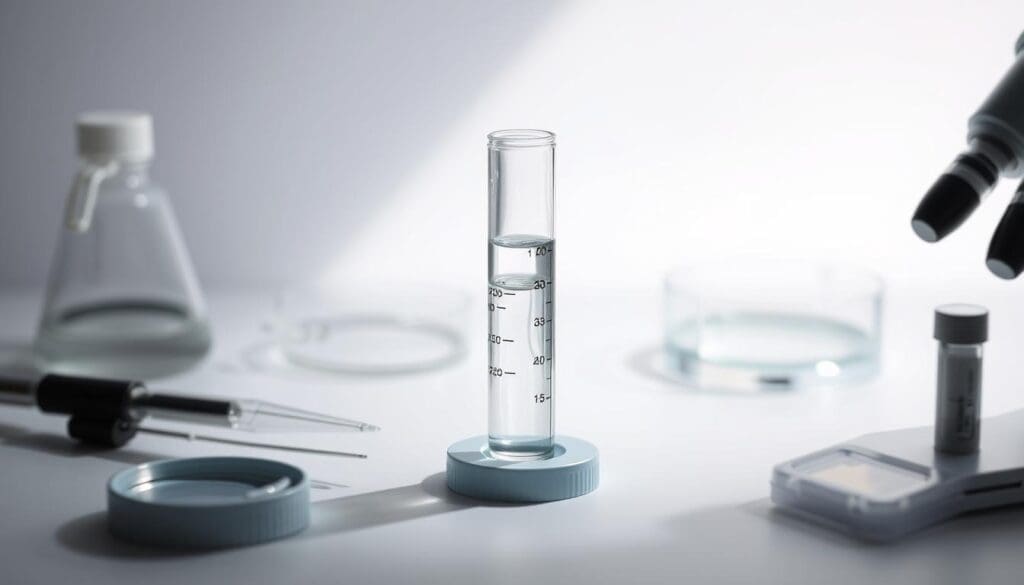Last Updated on November 25, 2025 by Ugurkan Demir

Knowing about sperm health is key for those trying to have a baby. A sperm count test is a must to check if a man is fertile.Learn where you can get a sperm count done and ways to improve sperm health for pregnancy.where do you get a sperm count done
At Liv Hospital, we offer top-notch care and the newest methods to help with your reproductive health. You can get a sperm count test at urology centers, fertility clinics, or hospital labs. It’s important to check the number, movement, and shape of sperm for conception.
Healthy sperm is essential for fertility. We will look at different ways to get a sperm count test and how to boost sperm health for pregnancy.

Male fertility is about many things that affect sperm health. It’s key for getting pregnant. Several factors help a man’s ability to conceive.
Several important factors affect male fertility. These include sperm count, motility, and morphology. Sperm count is how many sperm are in a man’s ejaculate. Motility is how many sperm move. Morphology looks at sperm shape and structure. All are important for getting pregnant.
At-home kits like SpermCheck and YO check sperm count and motility. They give insights into male fertility. A healthy sperm count is at least 15 million sperm per milliliter. These tests are easy to use at home.
Sperm count is very important for getting pregnant. More sperm means better chances of fertilization. But, even with fewer sperm, getting pregnant is possible. Knowing your sperm count helps you understand your fertility and how to improve it.
To improve sperm health, make lifestyle changes and eat better. Sometimes, medical help is needed. Knowing what affects male fertility helps improve reproductive health.

Understanding male fertility starts with a sperm count test. This test, also known as a semen analysis, checks a semen sample. It looks at sperm concentration, motility, and shape, all important for fertility.
A semen analysis checks many aspects of sperm health. The main parts include:
| Parameter | Normal Value | Significance |
| Sperm Concentration | > 15 million/ml | Affects the chances of fertilization |
| Sperm Motility | > 32% motile | Essential for sperm to reach the egg |
| Sperm Morphology | > 4% normal forms | Influences the ability to fertilize an egg |
If you’re having trouble getting pregnant, a sperm count test is a good first step. Men with certain health issues, toxin exposure, or lifestyle factors that might affect fertility should also consider testing. Talk to a healthcare provider to see if a sperm count test is needed.
Doctors often suggest lifestyle changes and supplements to boost sperm count. Eating well, exercising, and avoiding heat on the testicles can help. Supplements like antioxidants might also be helpful.
It’s important to know where to get a sperm count done to check male fertility. There are several options, each with its own benefits.
Fertility clinics and specialized urology centers are top choices for sperm count tests. They offer detailed fertility tests, like semen analysis. This test checks sperm count, motility, and shape. These places have skilled professionals and the latest technology for accurate results.
Hospital laboratories are also good for sperm count tests. Many hospitals have andrology or fertility departments for semen analysis. These labs use modern tech and have skilled staff for trustworthy results.
“Hospital laboratories offer a reliable and efficient way to get a sperm count test, with the added benefit of being part of a broader healthcare network.”
Some men start with their primary care doctor. Doctors can send you to specialized centers or labs for sperm count tests. This is great for those who want a more personal approach or have other health issues.
In conclusion, men have many choices for sperm count tests. These include fertility clinics, urology centers, hospital labs, and primary care referrals. The best choice depends on what you prefer and your needs.
Medical technology has made at-home sperm testing kits a reliable and private option. Men can now check their fertility from home. This means no need for a clinical visit.
FDA-cleared home test kits give accurate results, just like in a clinic. They’ve been tested thoroughly and are available without a doctor’s prescription.
Key Benefits:
SpermCheck is a well-known at-home sperm test kit. It measures sperm concentration. It’s designed for a simple, accurate, and fast sperm count check.
The YO Sperm Test is another at-home testing solution. It measures sperm concentration and motility. This gives a detailed look at sperm health.
| Feature | SpermCheck | YO Sperm Test |
| Measures | Sperm Concentration | Sperm Concentration and Motility |
| Result Time | Within minutes | Within minutes |
| FDA Cleared | Yes | Yes |
At-home sperm testing kits like SpermCheck and YO Sperm Test are great. They’re private, convenient, and reliable. They’re perfect for those trying to conceive or worried about their fertility.
Getting your sperm test results can be a big moment. But knowing what they mean is key for what comes next. Your test results give you insights into your fertility. We’re here to help you understand them.
To grasp your sperm test results, knowing normal parameters is vital. The World Health Organization sets these standards:
These standards help judge your sperm health. Having a low sperm count doesn’t always mean you can’t get pregnant. But, it might make it harder.
Now, let’s look at the main parts of your sperm test results:
Concentration is the number of sperm per milliliter of semen. A higher number means better fertility chances.
Motility shows how many sperm are moving. Good motility is key for sperm to reach the egg.
Morphology checks the shape and structure of sperm. Good morphology is vital for successful fertilization.
Knowing these parts helps you understand your fertility. It’s not just one thing; it’s how they all work together.
If your results show any issues or you’re having trouble conceiving, more tests might be needed. These tests can find problems that affect your fertility.
Seeing a fertility specialist is a good idea if you’re worried about your results or can’t get pregnant. They can offer personalized advice and support to help you reach your fertility goals.
Couples facing fertility issues often wonder if a low sperm count can lead to pregnancy. The answer is complex. It depends on many factors beyond just sperm count.
A low sperm count can affect fertility, but it’s not a sure sign of infertility. Several factors can influence the chances of conception. These include:
The success rates for getting pregnant with a low sperm count vary. Each person’s fertility is unique. What works for one couple may not work for another. Men with low sperm counts can father a child, but it may take longer.
It’s essential to have realistic expectations and to be patient. Talking to fertility specialists can help understand the situation better and find the best approach.
In some cases, extra fertility treatments are needed to get pregnant. These can include:
Medical specialists may suggest lifestyle changes and supplements to boost sperm count and health. While getting pregnant with a low sperm count is possible, understanding the factors and exploring treatments can improve chances.
Medical treatments can help men boost their sperm count and fertility. They address health issues and use specific treatments. This way, men can greatly improve their reproductive health.
Fixing underlying medical conditions is key to better sperm count. Issues like hormonal imbalances, infections, or blockages can harm sperm production. By treating these, men can see their sperm count go up.
Hormonal imbalances can be fixed with hormone therapy or special meds. Infections need antibiotics, and blockages might need surgery. Solving these problems can boost reproductive health and conception chances.
There are many meds to help with sperm production. These include:
It’s important to talk to a doctor to find the right meds and treatment plan.
If you’re having trouble getting pregnant or worry about your sperm count, see a fertility specialist. They offer personalized advice, diagnose problems, and suggest treatments.
Fertility specialists help men understand their reproductive health. They find and fix issues and create a plan to boost sperm count and fertility. Getting professional help is a big step towards reaching reproductive goals.
Making lifestyle changes can boost sperm count naturally. Improving diet and exercising regularly are key. These habits can enhance sperm health and fertility.
Eating a balanced diet is vital for sperm production. Foods rich in antioxidants, like fruits, vegetables, and nuts, protect sperm from damage.
Key nutrients for sperm health include:
| Nutrient | Food Sources | Benefit to Sperm Health |
| Zinc | Oysters, beef, chicken, pumpkin seeds | Testosterone production, sperm development |
| Folate | Leafy greens, legumes, citrus fruits | DNA synthesis, repair |
| Omega-3 fatty acids | Salmon, walnuts, chia seeds | Sperm membrane health |
Regular exercise and a healthy weight are critical for sperm health. Exercise boosts circulation, reduces stress, and improves overall well-being.
But, too much exercise or extreme weight loss can harm sperm production. It’s important to find a balance.
High temperatures can damage sperm. So, it’s key to avoid hot tubs, saunas, and wear loose-fitting clothes to keep testicles cool.
Too much alcohol can hurt sperm count and quality. Cutting down on alcohol can improve sperm health.
By adopting these lifestyle changes, men can actively improve their sperm health and fertility chances.
Antioxidants and supplements are key for better sperm count and quality. Men looking to boost their fertility often turn to these options.
Some supplements can really help sperm health. Here are a few:
Antioxidants are vital for protecting sperm from damage. Damage from oxidative stress can harm sperm count, movement, and shape. Men can improve their sperm health by adding antioxidants to their diet.
Some important antioxidants are:
While supplements are helpful, it’s important to follow the right dosages. Always talk to a healthcare provider first. Too much of a good thing can be bad.
For example, men need about 11 mg of zinc daily. Too much zinc can cause problems. Also, too much folic acid can hide signs of vitamin B12 deficiency.
Understanding supplements and antioxidants can help men improve their fertility. But, it’s also important to live a healthy lifestyle for the best results.
Using holistic methods can really boost sperm health and naturally increase sperm count. By focusing on being well-rounded, you can boost your fertility without just medical help.
Enough sleep is key for health, including reproductive health. Studies show that good sleep boosts sperm production and quality. Aim for 7-8 hours each night to help control hormones needed for sperm.
Too much stress can hurt sperm count and quality. Activities like meditation, yoga, or deep breathing can help lower stress. These not only improve your mind but also your reproductive health.
Smoking and toxins harm sperm health. Quitting smoking and avoiding pollutants can improve sperm count and quality. Living a healthier life by avoiding harmful substances is key for better fertility.
Keeping a healthy weight is important for sperm health. Being too heavy or too light can mess with hormone levels and sperm production. Regular exercise and a balanced diet help keep a healthy weight, supporting fertility.
By adding these holistic methods to your daily life, you can actively improve your sperm health and count. It’s about making lasting lifestyle changes that support your overall health and fertility.
| Holistic Approach | Benefits for Sperm Health |
| Adequate Sleep | Regulates hormones essential for sperm production |
| Stress Management | Reduces negative impact of stress on sperm count and quality |
| Quitting Smoking | Improves sperm count and quality by avoiding toxins |
| Healthy Body Weight | Supports hormone balance and sperm production |
Getting pregnant with low sperm count needs careful planning. But, with the right strategies, many couples can succeed. Knowing what affects fertility and making smart choices can boost your chances.
Timing sex with the woman’s ovulation cycle is key for better fertility. Ovulation happens once a month, about 14 days before the period starts. Couples can use kits or apps to find the best days. Trying every other day during these days can help a lot.
Changing your lifestyle can help both partners. Eating well, with lots of antioxidants, vitamins, and minerals, can improve sperm quality. Regular exercise, a healthy weight, and less stress are good too. Also, cutting down on alcohol and quitting smoking can help a lot.
If you haven’t gotten pregnant after a year, or if sperm count is very low, think about assisted reproductive technologies (ART). This includes IVF or IUI. Talking to a fertility specialist can help find the best treatment for you.
Knowing about fertility treatments and their success rates can help you make good choices. This is important for your reproductive journey.
Understanding and improving sperm health is key for those trying to conceive. By making smart lifestyle choices and getting medical help when needed, we can manage our fertility journey.
Improving sperm health can greatly boost fertility. We’ve looked at many ways to do this, from medical treatments to lifestyle changes and holistic practices. By using these methods together, people can improve their chances of getting pregnant.
Being proactive about sperm health is part of taking control of your fertility journey. With the right info and support, we can make smart choices and feel confident. By focusing on sperm health, we can improve our fertility and increase the chances of a successful pregnancy.
A normal sperm count is at least 15 million per milliliter of semen. But, the health of the sperm matters too. This includes how well they move and look.
Yes, getting pregnant with low sperm count is possible. But, it might be harder. The health of the sperm, when you have sex, and the woman’s fertility all play a part.
To boost sperm count, try medical treatments, lifestyle changes, and natural methods. Treat health issues, eat well, exercise, avoid bad substances, and manage stress.
Improving sperm health means staying healthy, exercising, and avoiding too much heat. Also, drink less alcohol and quit smoking.
Some supplements, like antioxidants and vitamins, can help sperm health. But, talk to a doctor first to find the right amount and when to take it.
A semen analysis is the best way to check sperm health. It looks at concentration, movement, and shape. This gives a full picture of your fertility.
Yes, stress can harm sperm count and fertility. Try stress-reducing activities like meditation or yoga to help.
If you’re trying to conceive for a long time without success, see a fertility specialist. They can guide you and suggest treatments.
At-home kits like SpermCheck and YO Sperm Test are easy and private. They give insights into sperm health, including count, movement, and fertility.
To boost your chances, time sex right, live healthy, and think about fertility treatments if needed.
National Center for Biotechnology Information. (2025). How Can You Get a Sperm Count Test. Retrieved from https://www.ncbi.nlm.nih.gov/pmc/articles/PMC10929669/
Subscribe to our e-newsletter to stay informed about the latest innovations in the world of health and exclusive offers!